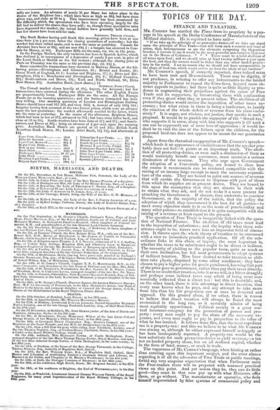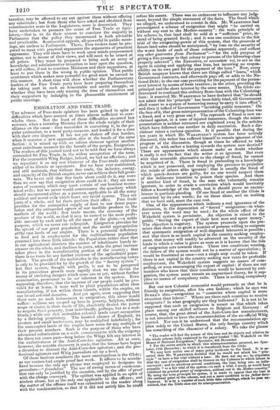TOPICS OF THE DAY.
FINANCE AND TAXATION, MR. CODDEN has startled the Times from its propriety by a pas- sage in his speech at the Derby Conference of Manufacturers of the Midland districts. He is reported to have said- " If we take up the principle of no protective-duties-if we take our stand upon the principle of Free Trade-that will form such a cement and bond of
union, that, heterogeneous as are the elements composing the Opposition benches, I venture to say it would be the most powerful and complete that ever sat in the Rouse of Commons. • • * There must be a total abolition of
all taxes upon food; and we should raise at least twenty millions a year upon the land, and then the owners would be richer than any other landed proprie- tary in the world. I see no reason why we should not have compensation in the shape of land-tax, which would relieve us from the whole of our burdens."
Mr. COBDEN'S speech, if correctly reported, does indeed seem to have been rash and ill-considered. There may be dignity, if
not prudence, in refusing to offer any inducements to the landed majority in Parliament to repeal the Corn-laws, beyond mere ab- stract appeals to justice; but there is quite as little dignity as pru- dence in augmenting their prejudices against the cause of Free Trade and its supporters, by threatening them with confiscation even if they grant what they at present refuse. The abolition of all protecting-duties would render the imposition of other taxes ne- cessary; but what crime is there in being a landowner, to justify the exaction of the whole deficit of revenue from his class exclu- sively? It is anger, not wisdom, not justice, that speaks in such a proposal. It would be to punish the supporter of the " Bread-tax," who supports it in error, along with him who supports it (if such a one can be supposed) out of lucre love of oppression : it would in- deed be to visit the sins of the fathers upon the children, for the proposed land-tax does not appear to be meant for our generation alone.
Apart from the rhetorical exaggeration of Mr. COBDEN'S speech- which lends it an appearance of vindictiveness that the speaker pro-
bably does not feel-it points at an hnportant truth. The aboli- tion of all protecting-duties, or even such a diminution of them as would materially benefit our commerce, must occasion a serious diminution of the revenue. They who urge upon Government the adoption of a Free-trade policy, are bound to show how the course it recommends can be rendered compatible with the raising of an income large enough to meet the necessary expendi- ture of the state. They are bound to point out sources of revenue that will enable the Government to dispense with part of those from which its supplies are at present drawn. They are bound to this upon the assumption that they are sincere in their wish to obtain what they ask, and do not make it a mere pretext for attacking the Government. If sincere, they undertake to convince Government, or the majority of the nation, that the policy the adoption of which they recommend is the best for all parties-to meet every objection made to it on the score of practicability and many other points-to establish that it is quite compatible with the raising of a revenue at least equal to the present.
The question of Free Trade is inseparably linked with the ques- tion of National Finance. The abolition of old taxes must lead to the imposition of substitutes ; and the inquiry what those sub- stitutes ought to be, forces men into an important field of discus- sion. It throws open the whole theory of taxation to be canvassed with a view to immediate practical application. Of all the sub- ordinate links in this chaiu of inquiry, the most important is, whether the taxes to be substituted ought to be direct or indirect.
The necessity of yielding to the popular taste, quite as much as their own inclination, has led most governments to adopt systems of indirect taxation. Men have desired to take taxation as chil- dren take physic, disguised by some other condiment : they have chosen to pay a higher price for goods purchased, knowing that part of the price goes to governtuent, rather than pay their taxes directly. There is no doubt that taxation, take it as we will, is a bitter draught; and perhaps some indirect taxes may admit of being more eco- nomically collected than a direct tax : but this is doubtful; and, on the other hand, there is this advantage in direct taxation, that every man knows what he pays, and any attempt to take more from him than his fair proportion can at once be detected and opposed. On this ground alone, if no other, there is reason to believe that direct taxation will always be found the most economical in the long run, as it certainly admits of being most equitably apportioned. Political society is a great mu- tual insurance-company for the protection of person and pro- perty: every man ought to pay his share of the necessary ex- penses, and every man ought to pay in proportion to the value of
what he has insured. It follows from this, that the most expedient tax is a property-tax : and this we believe to be what Mr. COBDEN
was aiming at, although he either expressed himself unhappily or has been inadequately reported. A property-tax would be the best substitute for such protective-duties as y icld revenue,-a tax not on landed property alone, but on all realized capital, whether in the form of land, money, or stock in trade.
The vagueness of Mr. COBDEN'S language, when hinting at rather than entering upon this important subject, and the utter silence
regarding it of all the advocates of Free Trade at public meetings, forbid any very sanguine expectation that when Parliament meet the Free-traders there will be prepared with matured practical
views on this point. And yet unless they be, they can do little good-they must in that case put up with what Ministers offer them, or go without. T he manufacturer or operative, who feels himself impoverished by false systems of commercial policy and
taxation, may be allowed to cry out against them without offering any substitute ; but from those who have asked and obtained from constituencies seats in the Legislature, more is demanded. They have undertaken to promote the cause of Free Trade as legis- lators,—that is, to do their utmost to convince the majority in Parliament that the policy they recommend is both advisable and practicable. Sentimental appeals, all-powerful in public meet- ings, are useless in Parliament. There, Free traders must be pre- pared to meet with practical arguments the arguments of practical opponents. They will there have to work upon minds prepossessed against, not in favour of their views, and will need to be armed at all points. They must be prepared to bring such an array of knowledge and administrative invention to bear upon the question, as will suffice, if not to convince Ministers and their supporters, at least to put them in the wrong in public opinion. That public confidence which makes men powerful for good must be earned in this manner. A short time will show whether the Parliamentary leaders of the Free Trade party have been preparing themselves for taking part in such an honourable and useful struggle, or whether they have been only wasting the time of themselves and their supporters by indulging in the pleasurable excitement of public meetings.



























 Previous page
Previous page